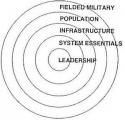25 December edition of the Weekly Standard - 'We're Going to Win' by Fred Barnes.
14 December American Enterprise Institute - Choosing Victory: A Plan for Sucess in Iraq by Frederick Kagan.It turns out you only have to attend a White House Christmas party to find out where President Bush is headed on Iraq. One guest who shook hands with Bush in the receiving line told him, "Don't let the bastards get you down." Bush, slightly startled but cheerful, replied, "Don't worry. I'm not." The guest followed up: "I think we can win in Iraq." The president's reply was emphatic: "We're going to win." Another guest informed Bush he'd given some advice to the Iraq Study Group, and said its report should be ignored. The president chuckled and said he'd made his position clear when he appeared with British prime minister Tony Blair. The report had never mentioned the possibility of American victory. Bush's goal in Iraq, he said at the photo-op with Blair, is "victory."
Now Bush is ready to gamble his presidency on a last-ditch effort to defeat the Sunni insurgency and establish a sustainable democracy in Iraq. He is prepared to defy the weary wisdom of Washington that it's too late, that the war in Iraq is lost, and that Bush's lone option is to retreat from Iraq as gracefully and with as little loss of face as possible. Bush only needed what his press secretary, Tony Snow, called a "plan for winning." Now he has one.
It's not to be found among the 79 recommendations of Jim Baker's Iraq Study Group. The ISG report was tossed aside by the White House. Nor was the scheme leaked by the Pentagon last week ever close to being adopted. That plan would pull thousands of American troops out of a combat role and turn them into trainers of the Iraqi army. The result would be increased sectarian violence and an Iraqi army not yet equipped to quash the swelling insurgency-leading to a gap of time in which there would likely be a further--probably fatal--collapse of civic order in Baghdad, and then elsewhere in Iraq.
Last Monday Bush was, at last, briefed on an actual plan for victory in Iraq, one that is likely to be implemented. Retired General Jack Keane, the former vice chief of staff of the Army, gave him a thumbnail sketch of it during a meeting of five outside experts at the White House. The president's reaction, according to a senior adviser, was "very positive." Authored by Keane and military expert Frederick W. Kagan of the American Enterprise Institute, the plan (which can be read at aei.org/publication25292) is well thought-out and detailed, but fundamentally quite simple. It is based on the idea--all but indisputable at this point--that no political solution is possible in Iraq until security is established, starting in Baghdad. The reverse--a bid to forge reconciliation between majority Shia and minority Sunni--is a nonstarter in a political environment drenched in the blood of sectarian killings.
Why would the Keane-Kagan plan succeed where earlier efforts failed? It envisions a temporary addition of 50,000 troops on the ground in Iraq. The initial mission would be to secure and hold the mixed Baghdad neighborhoods of Shia and Sunni residents where most of the violence occurs. Earlier efforts had cleared many of those sections of the city without holding them. After which, the mass killings resumed. Once neighborhoods are cleared, American and Iraqi troops in this plan would remain behind, living day-to-day among the population. Local government leaders would receive protection and rewards if they stepped in to provide basic services. Safe from retaliation by terrorists, residents would begin to cooperate with the Iraqi government. The securing of Baghdad would be followed by a full-scale drive to pacify the Sunni-majority Anbar province...
Victory is still an option in Iraq. America, a country of 300 million people with a GDP of $12 trillion, and more than one million soldiers and marines can regain control of Iraq, a state the size of California with a population of 25 million and a GDP under $100 billion.
Victory in Iraq is vital to America’s security. Defeat will lead to regional conflict, humanitarian catastrophe, and increased global terrorism.
Iraq has reached a critical point. The strategy of relying on a political process to eliminate the insurgency has failed. Rising sectarian violence threatens to break America’s will to fight. This violence will destroy the Iraqi government, armed forces, and people if it is not rapidly controlled.
Victory in Iraq is still possible at an acceptable level of effort. We must adopt a new approach to the war and implement it quickly and decisively.
Three courses of action have been proposed. All will fail.
- Withdraw immediately. This approach will lead to immediate defeat. The Iraqi Security Forces are entirely dependent upon American support to survive and function. If U.S. forces withdraw now, they will collapse and Iraq will descend into total civil war that will rapidly spread throughout the region.
- Engage Iraq’s neighbors. This approach will fail. The basic causes of violence and sources of manpower and resources for the warring sides come from within Iraq. Iraq’s neighbors are encouraging the violence, but they cannot stop it.
- Increase embedded trainers dramatically. This approach cannot succeed rapidly enough to prevent defeat. Removing U.S. forces from patrolling neighborhoods to embed them as trainers will lead to an immediate rise in violence. This rise in violence will destroy America’s remaining will to fight, and escalate the cycle of sectarian violence in Iraq beyond anything an Iraqi army could bring under control.
We must act now to restore security and stability to Baghdad. We and the enemy have identified it as the decisive point.
There is a way to do this.
- We must change our focus from training Iraqi soldiers to securing the Iraqi population and containing the rising violence. Securing the population has never been the primary mission of the U.S. military effort in Iraq, and now it must become the first priority.
- We must send more American combat forces into Iraq and especially into Baghdad to support this operation. A surge of seven Army brigades and Marine regiments to support clear-and-hold operations starting in the Spring of 2007 is necessary, possible, and will be sufficient.
- These forces, partnered with Iraqi units, will clear critical Sunni and mixed Sunni-Shi’a neighborhoods, primarily on the west side of the city.
- After the neighborhoods have been cleared, U.S. soldiers and marines, again partnered with Iraqis, will remain behind to maintain security.
- As security is established, reconstruction aid will help to reestablish normal life and, working through Iraqi officials, will strengthen Iraqi local government.
This approach requires a national commitment to victory in Iraq:
- The ground forces must accept longer tours for several years. National Guard units will have to accept increased deployments during this period.
- Equipment shortages must be overcome by transferring equipment from non-deploying active duty, National Guard, and reserve units to those about to deploy. Military industry must be mobilized to provide replacement equipment sets urgently.
- The president must request a dramatic increase in reconstruction aid for Iraq. Responsibility and accountability for reconstruction must be assigned to established agencies. The president must insist upon the completion of reconstruction projects. The president should also request a dramatic increase in CERP funds.
- The president must request a substantial increase in ground forces end strength. This increase is vital to sustaining the morale of the combat forces by ensuring that relief is on the way. The president must issue a personal call for young Americans to volunteer to fight in the decisive conflict of this age.
- Failure in Iraq today will require far greater sacrifices tomorrow in far more desperate circumstances.
Committing to victory now will demonstrate America’s strength to our friends and enemies around the world...









Bookmarks